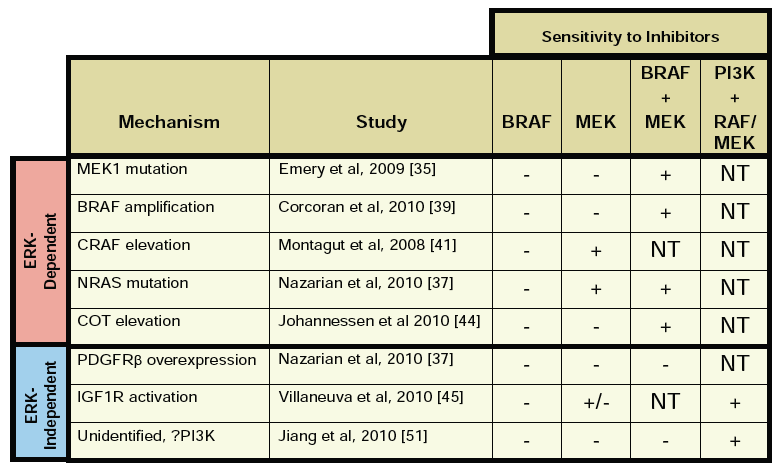An overview of mechanisms of resistance to BRAF
A new paper has just been published on the mechanisms associated with BRAF resistance by Corcoran et al., (2011). One of the things I liked about this paper, other than it’s clarity and simplicity, is that you can find it in OncoTarget, an open access cancer journal (see references below), with a prestigious editorial board including Carlo Croce, Bert Vogelstein, Pier Palo Pandolfi, Wafik El Deiry, and Brian Druker to mention a few of the researchers.
The article essentially describes ERK and non-ERK dependent methods by which resistance occurs to BRAF inhibitors such as PLX4032 (vemurafenib). These are summarised in the table below:

As a result of these findings on the underlying biology to date, the authors suggest that different treatment strategies can be considered:

As our knowledge of the science of metastatic melanoma improves, so do our opportunities for therapeutic intervention and improvement in outcomes.
Metastatic melanoma is likely to be a hot topic at the forthcoming ASCO annual meeting next month with updated data from the vemurafenib and ipilimumab clinical trials. I will add a more detailed post once the new data has been presented.
In the meantime, this paper is well worth reading – check it out!
References:
![]() Corcoran RB, Settleman J, & Engelman JA (2011). Potential Therapeutic Strategies to Overcome Acquired Resistance to BRAF or MEK Inhibitors in BRAF Mutant Cancers. Oncotarget PMID: 21505228
Corcoran RB, Settleman J, & Engelman JA (2011). Potential Therapeutic Strategies to Overcome Acquired Resistance to BRAF or MEK Inhibitors in BRAF Mutant Cancers. Oncotarget PMID: 21505228